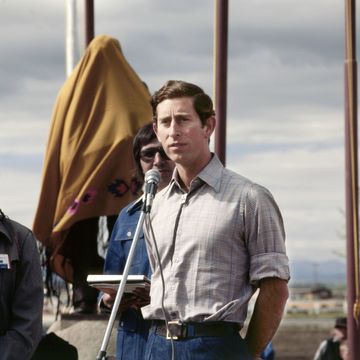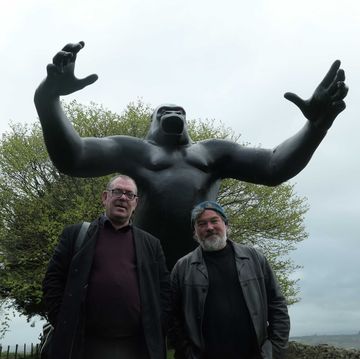Imagine a future where your great, great grandchildren are gathered around a room flicking through web pages projected into the air.
They’ve probably got holograms of their favourite artists playing in the background as they pore over your social media history, trying to piece together who their great, great grandparent was via archaic “Twitter” and “Instagram” posts.
How much of you is left, in this digital world, after you've ceased to exist in the real one? And how much of it is really up to you?
‘Digital death’ is one of the biggest challenges facing the tech community, one that flags up a myriad of logistical, ethical and cultural questions that designers, academics, archivists and even will writers are working to figure out. Where does our data go when we’re gone? Who gets our Bitcoins? Should our social media accounts be preserved when we die, or shut down?
Back in 2010, writer Nikesh Shukla was mourning the sudden passing of his mother. Before him and his sister had resolved how to gently break the news to the family, the moment had been broadcasted by his uncle via a short Facebook status, simply reading: ‘RIP sis’.
Years later, Shukla recalls the trauma of the incident, one he about at the time in a short story for Radio 4 called ‘Confirm/Ignore’.
"Overnight, my mum’s Facebook account kind of became a shrine," he says. "People were leaving messages of condolences without really knowing the details. It was making me and my sister really upset so we thought, ‘Right, we'd better kill my mum on Facebook’.
"So we did: we deleted her, but not before finding out her digital footprint was harder to get rid of than we thought. Working out the processes was really difficult, and all this before we'd even had a death certificate issued.”
Prompted by distressed users like Shukla, Facebook trialled several different ways to crack the conundrum of death on its platform.
First, in 2010, it introduced a feature which allowed you to ‘memorialise’ a page - essentially freezing the person’s profile so that can’t be changed, but, depending on privacy settings, could still be commented on (the alternative was to request to remove the page altogether).
Precedent cases soon showed this to be an imperfect solution. The case of British woman Hollie Gazzard was particularly notable. In 2015, the 20-year-old was tragically murdered by her boyfriend, of whom she had posted pictures which were still visible on her profile page - pulled in automatically by Facebook’s algorithm - a whole year after her death.
After initially refusing to take them down, Facebook eventually bowed to public pressure and petitions and deleted the photos. While this appears to show the company is prepared to respond – albeit slowly – to real world anomalies, it’s worth noting it still continues to resolve such issues on a case-by-case basis with no guarantee over how long it will take.
After the Gazzard case, Facebook introduced their newest feature which allows users to pick a ‘legacy contact’: someone to manage your account after you pass away. After you’re gone, they’re able to do things like pin a post on your timeline, respond to new friend requests and update your profile picture - but won’t be able to post as you or see your messages. (You can do this by clicking Settings, Manage Account, and then selecting the ‘legacy contact’ option. The person you elect will then be sent an automatic message reading: “Hi xx, Facebook now lets people choose a legacy contact to manage their account if something happens to them…As you know me well and I trust you, I chose you. Please let me know if you want to talk about this”).
If, later, your friend chooses to absolve themselves of the responsibility of keeping your flame alive on Facebook, they can request to have your account deleted - or you can give that order to Facebook directly yourself (automated message: “Please confirm that you want your account to be deleted after your death. Once someone lets us know that you've passed away, all of your info, photos and posts will be permanently removed from Facebook and no one will be able to see your Profile again”).
Despite this provision, Facebook’s extremely long terms and conditions state clearly: ‘There is no provision that expressly terminates the contractual agreement between Facebook and a user who dies’.
It’s a similar story at the other giants of our online life. Google does not have a termination provision in their terms either, but it does have a similar ‘legacy contact’ system – they encourage you to nominate an ‘account trustee’ who acts much the same. Snapchat does not allow this, opting to simply make your account inactive with time. Twitter, conversely, won’t let anyone access your account in the event of your death, though the network will work with relatives to “deactivate” or delete your account - if they provide a death certificate.
Beyond the bureaucracy of how dying is processed online comes the question of how the digital world is reshaping the way in which we view death itself.
Dr Stacey Pitsillides is a lecturer in Design at the University of Greenwich, and her PHD explores the impact of digital death with particular reference to the work of psychologist Elaine Kasket, who interviewed hundreds of people for her upcoming book All The Ghost In The Machine which is about the emotion impact of death in digital spaces.
“A cultural shift has taken place where people have began not just talking about the dead, but actually quite viscerally, to the dead” says Pitsillides.
“Kasket found through her research that more and more people are leaving comments on walls rather than visiting gravestones.
“For them, profile pages are not only manifestations of a dead person, but offer a more tangible connection with them. They believe they are being ‘heard’ by the person they are grieving.”
Pitsillides herself first became interested in the subject after noticing visual representations of death in online games like Second Life, Eve Online and World of Warcraft.
“The first experience I had was with a Japanese man saying he wanted to bury his cat” she recalls. “No-one was willing to give this creature a proper memorial, and because he couldn't find a place in the real world to honour this animal he felt very close to, he turned to the virtual world and created this online pet cemetery instead.
“He ended up turning it into a business, selling grave plots and virtual flowers and candles to people. So a personal representation of grief became a communal representation. It showed the kind of grassroots creativity that is happening around the issue.”
‘Digital Death Day’ is an annual event in California started in 2010 by a small group of academics, entrepreneurs, prominent Second Life community members, lawyers, computer scientists and funeral directors. Today, over 200 people converge to forecast trends and look for design solutions to death.
“We discuss everything from Google and digital account management to studies by international scholars,” says Pitsillides.
“The aim is to talk in an open way about how online death is affecting our industry, the ethical questions it throws up and what people might want in the real world.”
In 2016, Pitsillides curated an installation where she and others asked people in real life how they wanted to die.
“Idea ranged from people having holograms of themselves at their funeral to having their DNA spliced with a tree so they can be part of that and grow forever,” she says.
These creative ideas are fun to consider, but what about the concrete logistics? What about the questions surrounding life and finance management in a world that is changing so fast, asking who will get your Bitcoins and access your Twitter might soon be as important as who will inherit your ISA?
Fidel Beauhill is a Bristol-based will writer and advocate for encouraging people to speak about the logistics of death. His conference, titled ‘You’re All Going To Die’, offers useful advice on how to manage your affairs learned first hand from his day job – something that increasingly involves matters of digital legacy.
I tell him of a conversation I had with my family earlier in the week, inspired by researching this article, about Facebook’s aforementioned ‘legacy contact’ solution. We have conflicting positions: my mum tells me she would want to delete all my accounts, while my sister would want to keep my profile alive as a memorial ground (a 2013 YouGov survey found that 45% of 18-24 year-olds would prefer their profiles to remain online, while only 25% of over 55s felt the same). Is this something families are starting to talk about?
“It’s not a conversation that happens before people die... but it's an argument happening more and more after people die” says Beauhill. “Unfortunately, the assets and the way these things are handled are down to the terms and conditions of the platform that you've signed up for, which don’t always have a duty of care.”
These terms and condition aren’t exactly designed to be easily understood by users - something Mark Zuckerberg’s recent senate hearings touched upon in no uncertain terms. Facebook’s Terms and Conditions - also known as the ‘Statement of Rights and Responsibilities and the Data Use Policy’ - consists of over 14,000 words and is updated regularly, leaving most users with scant hope of understanding exactly what rights they or their families have in the event of death. Often, it’s not the answer they want to hear.
“One things I’ve been asked about a lot by my clients recently is iTunes and Audible” he says. “Some of them have made significant investments in their music library and it means a lot to them. They ask: what happens to my iTunes account? What happens to my music and my books? Can I pass them on?
“Unfortunately, I often have to deliver bad news. Because with Apple, the stuff you buy is only licensed by you, not owned, so effectively when you die it just disappears.”
I ask him if I could feasibly write into my will that I want my mum to take over my social media account even though strictly, this is against the rules (section 4.8 of your contract with Facebook says clearly that ‘Password sharing is prohibited and users are also prohibited from letting anyone else access their account’). It’s important to note the difference to a legacy contact here – a password exchange would mean that your inbox messages can be read and they could post as you (or more sinisterly, Catfish your life after your death).
“You could” says Beauhill, “but it wouldn't necessarily be legally binding. It would be a request, because you don't have that power to grant full access yet... but these are questions for the future.
“Conversations around cryptocurrency like Bitcoins are starting to happen too,” he says. “How that will be dealt with will be interesting to see, because there is a myriad of platforms and digital wallets. That's a financial asset, so that's something that can be passed on to other family members in theory, but there isn’t a real legal precedent for Bitcoins yet”.
Beauhill maintains that there are good elements of the historical law we use today (the Wills Act 1837) but that we may need updating for a new generation - like the fact that digital wills don’t exist because in order to be valid, they need to be signed in front of two witnesses on hard paper as a safeguarding measure. These things are cultural too - and there is another conversation around how different communities openly discuss death and the logistics around it (the superstitiousness of many west African communities, for instance, or a tight-lipped British aversion to talking, all hinder how these ideas will move forward in the future).
“Perhaps that will evolve when fingerprint technology does so that you might have a video call and all three put their thumbs on at the same time,” he says, “but for now, preparation is key. My first bit of advice is to write a list of what accounts you've got, because family members rarely know what online bank accounts or libraries you have.”
Even if we were to settle upon a reliable system for ‘passing on’ control of our digital lives, applying real-world solutions to these digital challenges might not always work. Electing someone to be your legacy heir makes sense in that it mirrors what we do already, but what about the fallibility of humans?
Pitsillides, for one, remains sceptical. “What happens when you fall out with that person, or when that person dies themselves?” she asks. “We need to take these things into account if we want a social media that actually works when we die.”
This might be the moment to start thinking about how Artificial Intelligence can be applied in this context. Facebook, of course, already curates video montages about your life that fails to pick up on stuff you posted sarcastically, while Twitter shows you tweets in case you ‘missed’ them based on what it thinks you want to see. Despite our best attempts to curate obituaries for ourselves, it might ultimately, be the algorithms that have the final say about who we were.
Last year a journalist called James Vlahos created the ‘Dadbot’ by using hours of recorded conversations to reanimate and ‘interact’ with his father after he’d died. He transcribed 91,970 words of audio and using AI technology called PullString. Through FB messenger the bot can hold conversations and occasionally play recordings of his dad’s songs and jokes, mirroring real FB chats (many brands already use this kind of technology in their online customer services).
This idea presents one of the most pressing ethical questions of modern life: do we have a right to privacy after death? The most obvious and instinctive reaction is: yes, of course we do. Our data is ours, and ours alone. But post the Cambridge Analytica scandal, does anyone really believe this? The lines of data ownership are increasingly blurry and we know there are huge commercial - or even political - incentives for companies to try and harvest it. But what about the social and cultural argument for what to do with our data?
Back in 2010, the US Library of Congress announced that they would automatically archive all public tweets - a project that was eventually abandoned last year after the task was deemed too ‘ambitious’ – while in the UK, the British Library has demonstrated the importance of preserving digital life via online comic strips and UK Web Archiving, where they have been collecting websites since 2004 and web domains from the period of 1996-2013 ending in ‘.uk’. It’s a fascinating approach that speaks to our nostalgia for our own online footprints - wouldn’t you want to see your old MySpace profile just one more time?
Perhaps the most progressive way to think about social media is as a great, sprawling human archive of our historical moment. The way we interact, the evolution of language online, how we respond to the big news stories of our time – is there a case for saying this should all be preserved for history scholars of the future to look back on and learn from? That, for a generation with statistically less to ‘leave behind’ than those before in the way of home ownership, wealth and land, our data may be our most valuable legacy? Looking at digital death in this way, the pithy or earnest tweets we send, the Instagram pictures we post and our Facebook status updates could all, in time, become tiny breadcrumbs that allow future generations – or just those great, great grandchildren - to piece together who we once were.
Whether or not we can really ‘die’ in a digital space remains a conundrum, but what is clear is that by using small, logistical steps like storing passwords, electing legacy contacts in our wills and even taking steps to archive our data, we can try and take back some control of how we exist in the matrix: a small break from obsessing about how we’re viewed in the present to consider how we want to be remembered after we're gone.













